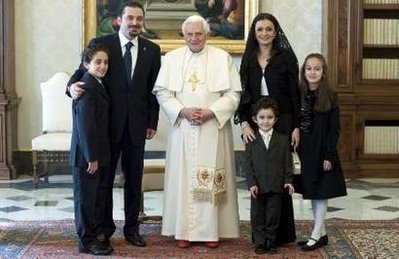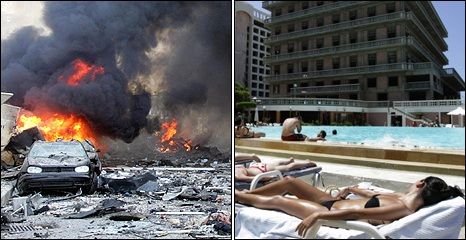
Pope Benedict XVI receives Lebanese Prime Minister Saad Hariri next to his wife Lara Azm, his sons Hussam (L), Rafik Junior (2nd R) and his daughter Lulwa (R) for an audience in his private apartment at the Vatican February 20, 2010. REUTERS/Pool/Christophe Simon (VATICAN – Tags: POLITICS RELIGION)
Vatican City – Pope Benedict XVI in a meeting Saturday with Lebanese Prime Minister Saad Hariri, praised the peaceful coexistence in Lebanon between various religious communities, including Druze, Christians and and Muslims. Hope was expressed "that the country (Lebanon), through the exemplary coexistence of the various religious communities … may continue to be a ‘message’ for the region of the Middle East and for the whole world," the Vatican said in a statement issued after the morning talks. In a newspaper interview hours before the meeting, Hariri, a Sunni Muslim, said he shares the pontiff’s concern for the Middle East’s dwindling Christian communities, in particular those in Iraq where many continue to flee abroad and are often targets of Islamist militant attacks. Benedict received Hariri at the Vatican Apostolic Palace where, "in an atmosphere of great cordiality," their talks focused on Lebanon and the broader situation in the Middle East, the Vatican statement said. "Having then highlighted the need to find a just and global solution to the conflicts affecting that region, reference was made to the importance of intercultural and inter-religious dialogue for the promotion of peace and justice," the statement added. The two leaders also recalled "the importance of the presence and activities of Christians in the country."(For picturesplease click read more)




